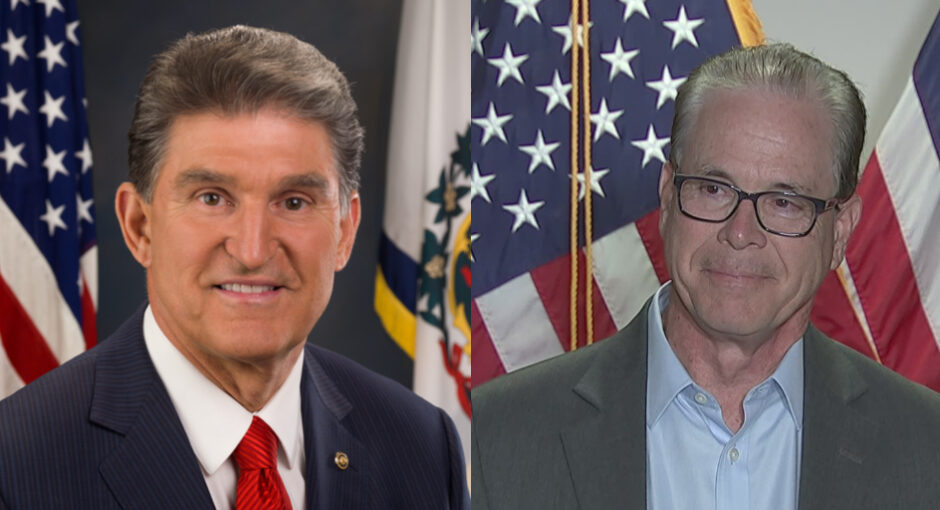Government health officials need to take immediate action to fully enforce the law against drug makers who are denying 340B drug discounts to providers who use contract pharmacies to dispense 340B-priced drugs, U.S. Senator Joe Manchin (D-W.VA.) and U.S. Senator Mike Braun ((R-Ind.) told U.S. Health and Human Services Secretary Xavier Becerra in a letter sent Wednesday.
“The restrictions imposed by drug companies on 340B discounts are causing alarming financial losses for safety-net hospitals, health centers, and other 340B providers as more companies impose such limits and increasingly target discounts on costly specialty drugs, [HHS’s Office of Inspector General] needs to fully enforce the law against all drug manufacturers who unlawfully overcharge safety net health care providers,” said the letter. HHS Inspector General Christi Grimm and Health Resources and Services Administration (HRSA) Administrator Carole Johnson were copied on the letter.
The senators lauded the agency for actions taken so far, with HHS sending enforcement letters to the nine drug companies that first began denying 340B drug pricing to 340B providers that had arrangements with contract pharmacies, with seven of the companies referred to OIG for possible sanctions. But more needs to be done, they said.
“The OIG is authorized to impose certain penalties against manufacturers that knowingly and intentionally overcharge 340B hospitals and health centers,” the letter said. “We urge the OIG to conclude its review as soon as possible and take any necessary action against manufacturers that are in violation of federal law.”
The lawmakers also urged HHS to review further enforcement actions against the remaining nine drug companies that imposed restrictions on 340B-priced drugs in the contract pharmacy setting, but have not yet been notified they are violating federal law nor subsequently referred to the OIG. “It is critical that both HHS and OIG enforce the law and penalize manufacturers who are overcharging 340B providers and dissuade more manufacturers from implementing similar policies, they told the officials.
Significance of Manchin and Braun
The letter may receive special attention considering Sen. Manchin’s crucial role in determining which legislative proposals make it through the narrowly divided Senate. President Biden has worked hard to listen to the centrist Manchin and has needed his support on a number of important bills including the recently passed Inflation Reduction Act. The fact that Sen. Braun co-signed the letter is striking given his long track record as a reliable ally of the pharmaceutical industry. Pharmaceutical giant Eli Lilly, one of the companies restricting access to 340B discounts, is based in Indianapolis.
Braun introduced a bill in September 2021 that would have enabled HRSA to audit 340B providers to track how they used 340B net income. He also sponsored legislation in October 2020 to impose reporting requirements on 340B disproportionate share hospitals (DSH), children’s, and free-standing cancer hospitals and require federal watchdog agencies to issue a number of reports on the drug discount program.
The Manchin-Braun letter told the agencies that, since the summer of 2020 when the first nine drug makers began denying 340B pricing to providers using contract pharmacies, “there has been overwhelming bipartisan opposition to these actions, and last year, HHS issued a strongly written advisory opinion concluding that these actions violate the 340B statute.”
The senators noted that there are 37 hospitals in West Virginia and 58 hospitals in Indiana enrolled in the 340B program. “For example, hospitals like West Virginia University Health System and Indiana University Health use their 340B savings to support patient care for vulnerable individuals, through critical programs such as bedside pharmacy discharge delivery and counseling,” the letter noted. “340B also allows the health system to maintain a mobile lung cancer screening unit, as well as diabetes support groups. For some rural hospitals, 340B helps keep their doors open.”
The letter noted that, since the alleged violations began in 2020, Congress has written multiple bipartisan letters opposing the drug companies’ restrictions, including letters to HHS calling for swift enforcement action. “However, despite calls for enforcement and the actions HHS has already undertaken, the problem has gotten worse,” it said. “While we wait for the OIG to assess further action, more drug manufacturers have implemented policies restricting access to 340B pricing.”
The letter pointed to a March 2022 survey showing the annualized impact from drug maker overcharges has more than doubled since 2021. “These actions are unlawfully denying hospitals’ drug savings they rely on to serve patients living with low incomes,” it noted, “The longer they are allowed to continue, the more harm this causes providers’ ability to care for patients most in need.”
The senators’ letter comes a few months after a similar letter to Becerra from a bipartisan group of 181 House lawmakers urging HHS and OIG to take more aggressive action against the pharmaceutical manufacturers. Becerra responded that his agency needs Congress to strengthen its enforcement power in order for it to move more aggressively against the drug companies.


